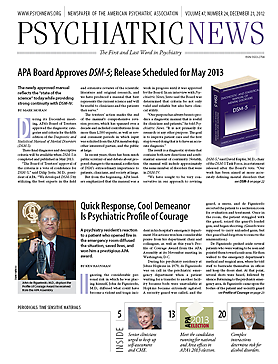The APA Assembly, at its meeting last month in Washington, D.C., approved the criteria sets proposed for DSM-5, which is scheduled for publication in May 2013. APA’s Board of Trustees gave final approval to DSM-5 a few weeks later (see APA Board Approves DSM-5; Release Scheduled for May 2013).
The Assembly’s DSM-5 Committee had recommended approval by the full Assembly and will continue to be available to review proposals that the DSM-5 Task Force might submit in the future. In addition, should any revisions be referred by the Board of Trustees for Assembly review, the Assembly Executive Committee was given the authorization to vote on those on behalf of the Assembly.
The Assembly also approved several papers related to patient-care issues. Among these was one addressing the adequacy of health insurance provider networks after years of complaints that the networks often are replete with providers who aren’t accepting new patients and those who are no longer affiliated with a particular network. The Assembly voted to urge APA to undertake a study of the extent of these and related problems regarding network directories of psychiatrists and to have APA “coordinate with other agencies and entities to identify potential solutions.”
Also endorsed was a proposal on prior authorizations for psychotropic medications in which the Assembly voted to have APA develop an official position statement. Issues of concern were authorization requests being determined by nurses, bachelor’s-level staff, or nonpsychiatric physicians and the harm that could result to patients because of delays in receiving or failure to receive drugs their psychiatrist believes are crucial to their treatment.
Contraceptive care for women with serious and chronic mental illness was addressed as well, with the Assembly calling on APA to develop a resource document on treating such women that includes information on pregnancy planning and urges psychiatrists to “routinely inquire about pregnancy plans and discuss the risk of unplanned pregnancies and use of contraception.”
MOC Issues Generate Proposals
Continuing concerns about the maintenance of certification (MOC) process were also in the forefront of Assembly discussion. Representatives endorsed a proposal to have APA “engage an independent education consultant to help assess whether the procedures in the American Board of Psychiatry and Neurology’s (ABPN) MOC program meet appropriate educational standards and are relevant to the practice of psychiatry.” A committee would also be appointed to develop questions for the consultants to address.
Some in the Assembly were also concerned about how psychiatrists who do not pursue MOC will be identified. A paper passed to address this issue calls on APA “to lobby the ABPN to use a system that does not stigmatize members with lifetime certification who do not choose to pursue MOC requirements . . . and to designate lifetime diplomates as ‘Lifetime certified, not participating in MOC and not required to do so.’ ”
Are Residents Trained for New Health Care World?
Another development that is affecting a substantial number of psychiatrists, particularly residents and early career psychiatrists, is the part of health care reform that is propelling adoption of accountable care organizations and medical homes in which the emphasis is on collaboration and multidisciplinary teams. With few data on how well residency programs are preparing their trainees for these new practice modes, the Assembly called for APA to survey recent psychiatry residency graduates and general APA members on their current work roles, how well their training prepared them for these roles, and areas in which residency training could be improved. The proposal states that residency training directors should be surveyed as well to obtain their perspective on how programs can meet the needs of psychiatrists practicing in the new and evolving medical workplaces.
With the Internet and social media now a routine part of life for many psychiatrists, Assembly representatives decided it was time for APA to begin developing guidelines on the appropriate professional use of these modes of communicating. They voted to have the Ethics Committee and the Council on Communications develop a set of guidelines to which APA members can refer when using the Internet or social media for marketing, patient education, and other practice-related activities.
The Assembly also heard a detailed explanation from Ronald Burd, M.D., chair of the APA Committee on RBRVS, Codes, and Reimbursements, in which he described the changes that will impact many of the CPT codes that psychiatrists use to bill for their services beginning in January. Burd emphasized that APA representatives to the committees and organizations responsible for updating the codes worked hard to ensure that the new codes enhance reimbursement for psychiatrists and better reflect the complexity of the patient services they provide (see Major CPT Coding Changes Coming Soon: Start Preparing Now).
In addition, Paul Summergrad, M.D., chair of the Work Group on the Role of Psychiatry in Healthcare Reform, updated Assembly members on the work of that committee, emphasizing that major changes in the way medical care is delivered are on the horizon, with a much stronger focus on cost, quality, and access-to-care issues. The accompanying shift in the role of psychiatrists in that new system is still unclear, but private practice won’t go away, he noted, though payment policies may favor care delivered through large systems. ■


